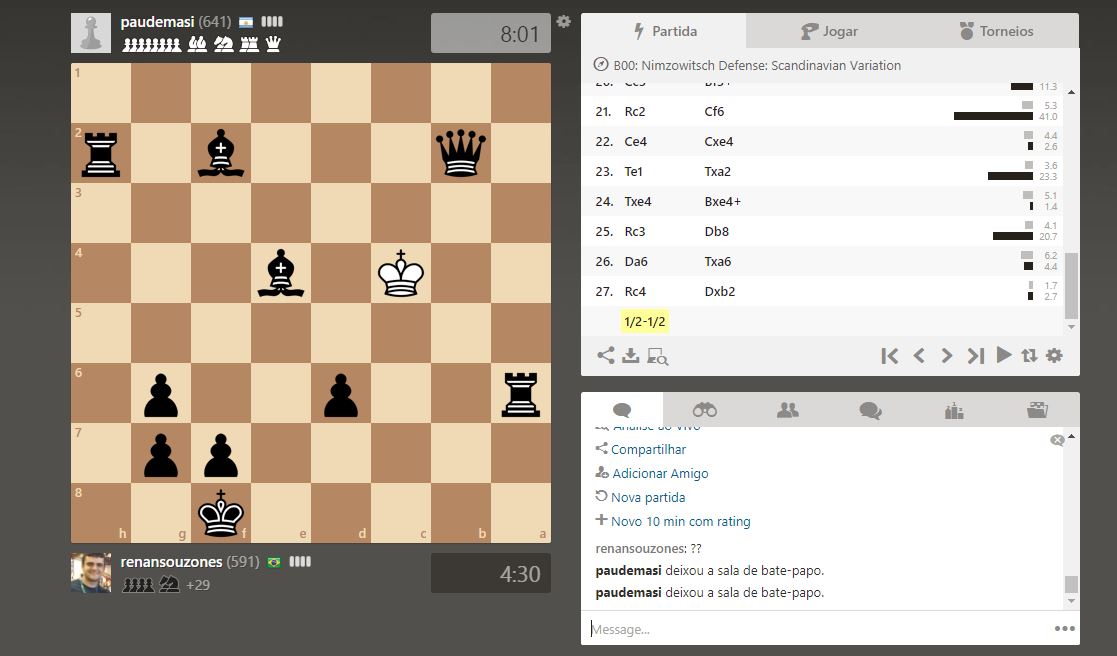In any size of a board, freestyle gomoku is an m,n,k-game, hence it is known that the first player can force a win or a draw. In 2001, Allis' winning strategy was also approved for renju, a variation of gomoku, when there was no limitation on the opening stage.
- Here are some Deadly Chess Opening Tricks & Traps to Win Fast and capture the queen in the Center Game variation. As you know, openings are the most exciting.
- For the most part, a draw occurs when it appears that neither side will win. Draws are codified by various rules of chess including stalemate (when the player to move has no legal move and is not in check), threefold repetition (when the same position occurs three times with the same player to move), and the fifty-move rule (when the last fifty successive moves made by both players contain no.
The subject of today's discussion might sound bizarre for most of you. Indeed, all the chess coaches as well as books, magazines and Web sites teach you how to win your games and here we talk about when to resign? And yet, I think any experienced chess player knows what I am talking about. Just look at the following games :
'So what?', many of you would ask, 'we see this kind of games every day in our chess club'. Indeed, this kind of 'endgame' where a lonely King fights practically the whole opponent's army is very common in the games played in parks or in your local Elementary School championship. But unfortunately all the games above were played in the Invitational US Championship (an adult Championship, mind you!) and the 'Player X' played all the games till a checkmate regardless of the position and the opponent's title. Some of you might call the last 15 - 20 moves in every game just a waste of time, but look at the situation from a different angle. In all the games the opponents of the 'Player X' were Masters or International Masters, so playing out this kind of a position is like saying ' I know that you have a ginormous material advantage , but are you good enough to checkmate me with an extra Queen?'. Some people probably can get insulted.
Another extreme is when a chess player resigns too early. Sometimes he does it (or at least has the temptation to do it) for a reason. Look for example at my own game:


After Kramnik played 18.f4! (somehow I totally missed this simple move), I immediately realized what happened, but of course it was too late. With absolutely no counter play in the center or on the Queen's Side, Black can only helplessly wait till White annihilates him on the King's Side. Black's position is absolutely hopeless, but it was a Super Tournament (Karpov won it) and we played in a theatre packed with spectators. This explains my comment to this game published in the New in Chess magazine: 'I should have resigned on the 18th move but was afraid that spectators wouldn't understand.' By the way, I think professional chess players should never forget that sometimes we need to play even absolutely clear positions for other people. Like in my last week's story I kept playing an absolutely drawn endgame for my wife (http://www.chess.com/article/view/should-your-girlfriendwife-play-chess), here I played a completely lost position for the chess fans who wanted to see the beautiful finish of Kramnik's positional masterpiece. So I thought that I had the right to resign only when it was absolutely clear that my King was going to get checkmated very soon.

But sometimes chess players resign a position which is not lost. Moreover, there are some examples where a game was resigned in a completely winning position! Here is probably the most infamous and old example where Black resigned in a winning position:
Ways To Win Chess
So, what is a proper point to resign a game? As always the answer is : 'it depends!' If you are a beginner, then you should never resign: Play till checkmate. First of all, your opponent, who is probably a beginner himself, may possibly stalemate you despite (or because of) his huge material advantage. But even if he does beat you, you'll get another lesson how to convert a winning advantage in to a win. But if you are an advanced chess player, then playing every single game till your opponent actually checkmates you is not the strategy I would recommend. Use your common sense because only you can decide what is the exact point when there is absolutely no hope to save the game. Just ask yourself from time to time what is the chance my opponent doesn't win this position. If the answer is 'only if he has a heart attack right now,' then probably it is time to quit.